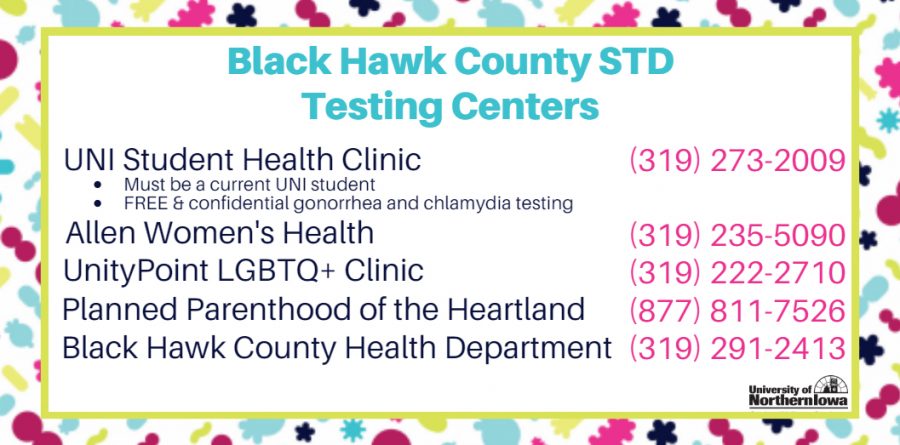STD Awareness Month: get yourself tested
Apr 9, 2018
Editor’s note: the following guest column was submitted by UNI Student Wellness Services.
The spring semester is winding down, and that means it’s time for exams and tests. One of the more important tests you can take is getting yourself tested for sexually transmitted diseases (STDs).
Contracting an STD is normal. In fact, according to the American Sexual Health Association, one in two (that’s half!) of sexually active individuals will contract an STD by the age of 25.
In the state of Iowa, teens 15 to 19 years old account for 22 percent of chlamydia cases, 18 percent of gonorrhea cases, and 5 percent of syphilis cases (Iowa Department of Public Health).
April is National STD Awareness Month, and you may be thinking, “Why should I get myself tested for an STD? I have never experienced any symptoms that would be associated with a sexually transmitted disease!”
Something many people may not realize is that the most common symptom associated with an STD is no symptoms at all, meaning you may have an STD and not even know it!
STDs don’t discriminate based on the way you look, who you are or your sexual preference. If you have been sexually active — even just one time — you are at risk of contracting and potentially transmitting an STD.
An STD (also commonly referred to as an STI, or sexually transmitted infection) that is left undiagnosed, and therefore, untreated, can result in potentially harmful health risks.
Untreated chlamydia or gonorrhea can cause infertility or even pelvic inflammatory disease in females. Luckily, if diagnosed, chlamydia and gonorrhea are curable with the use of antibiotics.
Keep in mind that not all STDs are curable, but all are treatable, and symptoms can be managed. It is important to get yourself tested so if you have an STD you can begin treatment and prevent spreading it to someone else.
If you have been sexually active and want to get tested, have no fear. Getting tested for STDs is quick, easy and painless!
You can make an appointment at the Student Health Clinic between 8 a.m. to 5 p.m., Monday through Friday, for STD testing.
Testing for chlamydia and gonorrhea is free and confidential. You can also make STD testing a part of your routine physical checkups to make sure your body is working the best it can.
To schedule an appointment, call the Student Health Clinic at (319) 273-2009.
So, let’s say you decide to get tested, and you are STD free (yay!). How do you make sure you stay that way?
An easy and effective way to prevent the transmission of STDs is to use condoms when engaging in vaginal, oral or anal sex. Condoms are the only contraceptive method that prevents against STDs.
There are many locations on campus where people can acquire free latex condoms:
- WRC fitness center restrooms
- Maucker Union restrooms
- LGBT* Center
- Student Health Center (external and internal condoms, water-based lubricant and more!)
Another way to prevent transmitting or contracting STDs is to talk with your partner. Being open and honest about sexually transmitted diseases shows you care not only about your sexual health, but also your partner’s.
Before you engage in a sexual relationship with someone, make it a point to bring up STD testing, or utilize protective barriers such as condoms.
Getting tested for STDs is a basic part of staying healthy. The only way to know for sure if you have an STD is to Get Yourself Tested!
— Beth Chaney, Graduate Assistant, Student Wellness Services


















